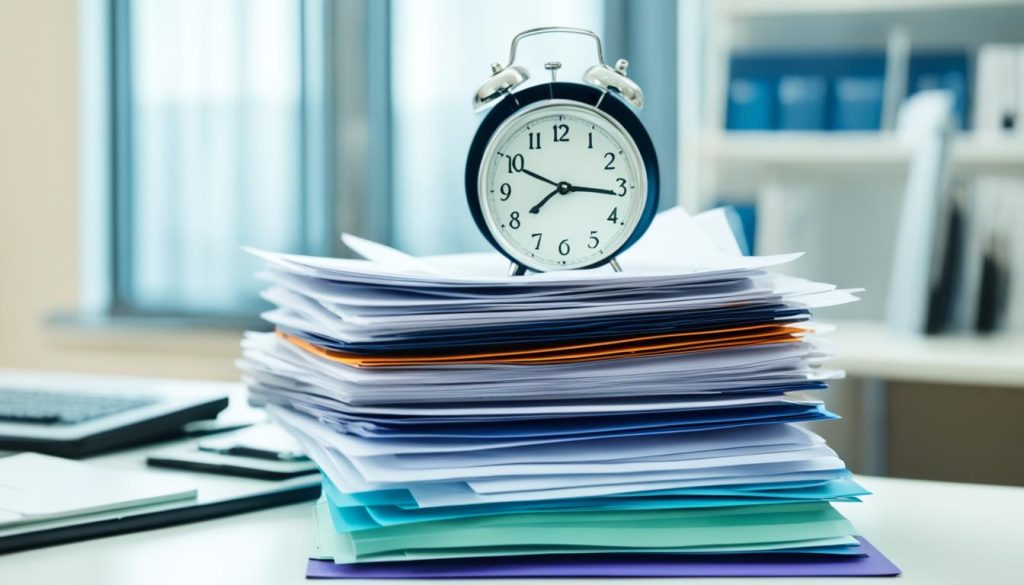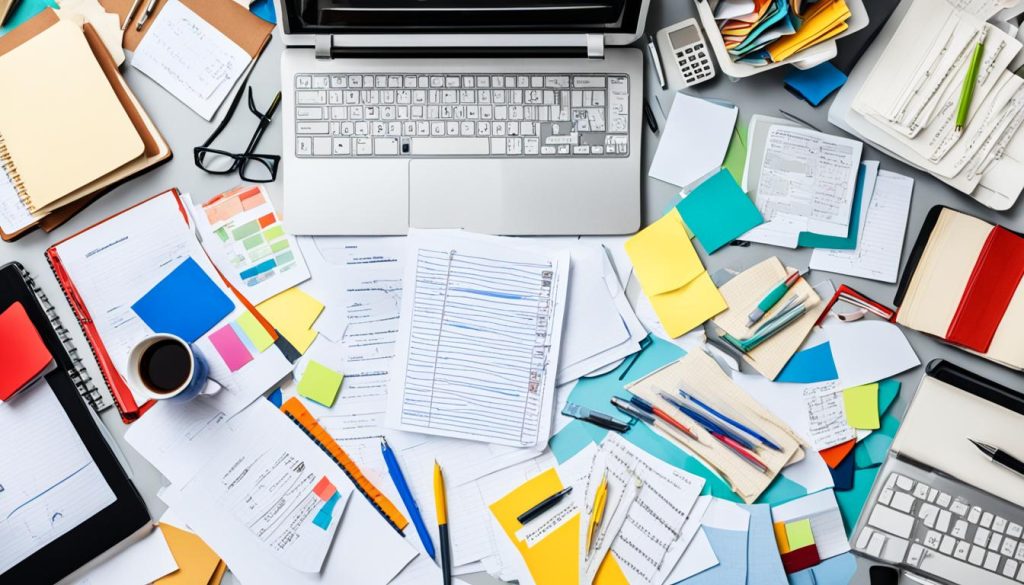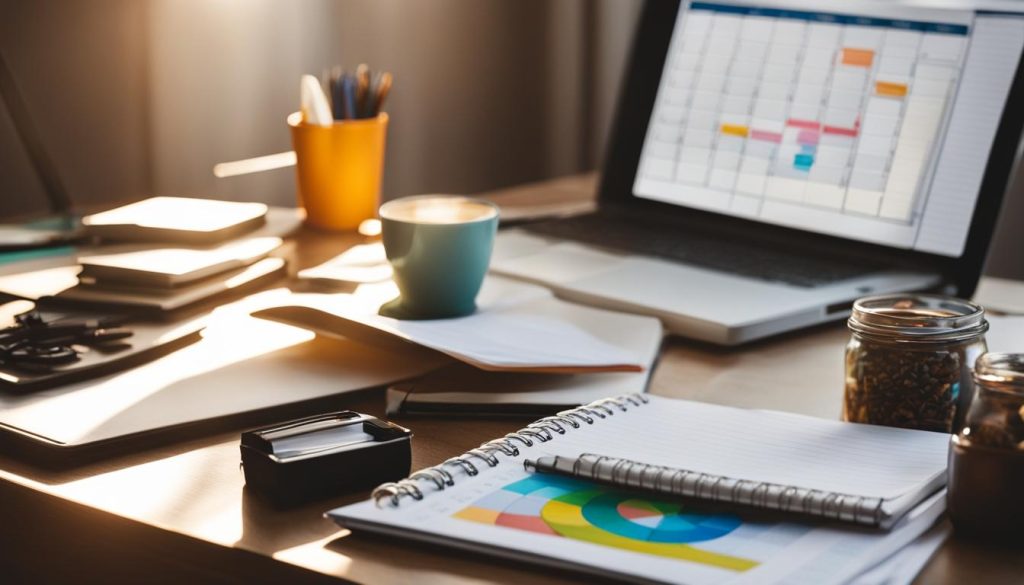Are you looking to improve your organisation skills and enhance productivity? Developing effective organisation techniques and improving time management can make a significant difference in your daily life and work environment. By decluttering your space, developing planning skills, and implementing an efficient task management system, you can establish a structured daily routine and become more organised in both your personal and professional life.
In this article, we will explore the best ways to be organised, whether at home or at your business, and provide practical tips and strategies to help you become more organised and productive.
Benefits of Being Organised
Being organised offers numerous benefits. It helps reduce stress by providing a clear view of tasks and priorities, allowing for better time management and reducing the feeling of being overwhelmed. With a well-organised system, individuals can focus on high-impact work and accomplish more without burning out. Being organised also creates more space for creativity and problem-solving, as mental energy is not wasted on trying to remember tasks or locate information. Additionally, an organised approach reduces work about work, such as following up on tasks, switching between apps, and searching for information, leading to increased productivity.

Reduced Stress
One of the key benefits of being organised is a reduction in stress levels. When everything is in order and tasks are clearly defined and prioritised, individuals can approach their work with a sense of calm and control. Being able to navigate through the day without feeling overwhelmed by overwhelming to-do lists and a cluttered workspace can greatly improve mental well-being.
More Time for Important Work
By implementing effective organisation techniques, individuals can free up more time for important work. When tasks are well-organised and prioritised, there is less time wasted on unimportant or low-value tasks. This allows individuals to focus their energy and efforts on high-impact work that truly moves the needle.
Increased Productivity
Being organised leads to increased productivity. When tasks and information are easily accessible, there is less time wasted searching for things or switching between apps and tools. An organised approach allows individuals to work efficiently and make the most of their available time, resulting in higher levels of productivity and output.
Less Work About Work
An organised system reduces the amount of work about work that individuals have to deal with. This includes tasks like following up on assignments, tracking down information, and switching between different tools and platforms. With an effective organisation system in place, individuals can spend less time on administrative tasks and more time on meaningful and impactful work.
How to Be More Organised?
Practical Tips for Organising Your Tasks
To be more organised with your tasks, it helps to track your to-dos in a central place, such as a digital to-do list manager. This frees up mental space and ensures that important tasks are not forgotten. Effective time management is also crucial for organisation. Techniques like time blocking, timeboxing, the Pomodoro technique, and eating the frog can help manage time and increase productivity. Practicing Inbox Zero can reduce digital clutter and ensure important messages are not missed. Prioritising work based on goals and deadlines helps focus on the most important tasks. Delegating tasks to others when appropriate allows for better efficiency. Lastly, decluttering physical and virtual spaces creates a more organised and productive environment.
Here are some practical tips for organising your tasks:
- Track your to-dos: Use a digital to-do list manager to keep track of your tasks in one central place. This helps you stay organised and ensures that important tasks are not forgotten.
- Manage your time: Utilise effective time management techniques like time blocking, timeboxing, the Pomodoro technique, and eating the frog to optimise your productivity.
- Practice Inbox Zero: Reduce digital clutter by regularly clearing your inbox and organising your emails. This helps ensure that important messages are not missed.
- Prioritise your work: Focus on the most important tasks by prioritising them based on goals and deadlines. This helps you stay on track and accomplish what matters most.
- Delegate tasks: When appropriate, delegate tasks to others to improve efficiency and free up your time for more important work.
- Declutter your space: Declutter both your physical and virtual spaces to create an organised and productive environment. Remove unnecessary items and files to reduce distractions and improve focus.
Implementing Effective Time Management Techniques
Effective time management is crucial for staying organised and boosting productivity. Here are some popular techniques:
| Technique | Description |
|---|---|
| Time Blocking | Allocate specific blocks of time to different tasks or activities to maintain focus and avoid multitasking. |
| Timeboxing | Set a fixed amount of time for each task or activity, ensuring that no single task takes up too much time. |
| The Pomodoro Technique | Work in focused 25-minute intervals, known as Pomodoros, followed by short breaks. After a set number of Pomodoros, take a longer break. |
| Eating the Frog | Tackle the most difficult or unpleasant task first thing in the morning to eliminate procrastination and build momentum. |

By implementing these practical tips and effective time management techniques, you can significantly enhance your organisation skills and boost your productivity. Remember to track your to-dos, manage your time efficiently, practice Inbox Zero, prioritise your work, delegate tasks, and declutter your space. These strategies will help you create a more organised and productive work environment, allowing you to accomplish more and feel more in control of your tasks and projects.
Organising Strategies for Long-Term Goals
To reach long-term goals, it is essential to stay organised. By focusing on what’s important, making lists, managing your time well, using calendars and planners, delegating tasks, reducing clutter, and staying organised, you can set yourself up for success.
Focusing on What’s Important
- Identify your priorities and align your actions with your goals.
- Eliminate distractions and avoid getting sidetracked by non-essential tasks.
Making Lists
- Create daily, weekly, or monthly lists to track your tasks.
- Ensure nothing is overlooked and stay on top of your responsibilities.
Managing Your Time Well
- Schedule quiet time to focus on important work.
- Do challenging tasks when your energy is high.
Using Calendars and Planners
- Utilise digital or physical calendars and planners to stay organised.
- Allocate time for different activities and avoid conflicts.
Delegating Tasks
- Recognise when it’s appropriate to delegate tasks to others.
- Free up time for more important responsibilities.
Reducing Clutter
- Clean up both your physical and digital spaces to create an organised environment.
- Eliminate unnecessary items and files.

By implementing these strategies, you can maintain focus, stay on track, and increase your chances of achieving your long-term goals. Remember, staying organised is key to long-term success and productivity.
Importance of Decluttering for Organisation
Decluttering plays a crucial role in effective organisation. By removing unnecessary items and creating clean and tidy spaces, you can experience a multitude of benefits that enhance your productivity and well-being.
Improved Focus
Decluttering your surroundings helps eliminate distractions, allowing you to concentrate better on the task at hand. With a clear and uncluttered environment, your mind can stay focused and engaged, leading to increased efficiency and performance.
Reduced Stress
A clutter-free space can significantly reduce stress levels. Studies have shown that a disorganized environment can contribute to feelings of overwhelm and anxiety. Decluttering promotes a sense of order and control, creating a calm and peaceful atmosphere that supports relaxation and mental well-being.
Enhanced Productivity
When your physical and digital spaces are free from clutter, you can easily locate necessary items, documents, and tools. This saves valuable time and allows you to work more efficiently, boosting your overall productivity. With everything in its proper place, you can quickly access what you need and remain focused on completing tasks.
Whether you are decluttering your home, office, or digital devices, the benefits are clear – an organised space leads to improved mental clarity and reduced feelings of overwhelm.

| Benefits of Decluttering |
|---|
| Improved Focus |
| Reduced Stress |
| Enhanced Productivity |
| Create Clean Spaces |
Incorporating Planning into Organisation
Planning is a crucial component of organisation. It plays a vital role in setting clear goals, breaking them down into smaller tasks, and tracking progress. By incorporating effective planning techniques into daily routines, individuals can enhance their productivity and achieve their goals more efficiently.
Importance of Planning
Effective planning is essential for better time management, prioritisation, and overall organisation. It enables individuals to allocate time and resources effectively, making the most of their abilities and opportunities. Planning helps create a roadmap, guiding individuals towards their desired outcomes and ensuring a more streamlined approach to tasks and projects.
When it comes to organisation, setting clear goals is crucial. Goals provide a sense of direction and purpose, helping individuals stay focused and motivated. By breaking down these goals into smaller, manageable tasks, individuals can overcome overwhelm and maintain productivity.
Tracking Progress and Maintaining a Schedule
Tracking progress is an integral part of planning and organisation. By monitoring the completion of tasks and milestones, individuals can evaluate their progress, identify areas for improvement, and make necessary adjustments to their strategies and schedules.
A schedule, whether digital or physical, is a valuable tool for maintaining organisation and staying on track. It helps individuals allocate specific time slots for different tasks, ensuring that each activity receives the attention it deserves. A well-maintained schedule also prevents overcommitment and allows for better time management.
Break Down Tasks
Breaking down tasks into smaller components is a key technique for effective planning and organisation. It allows individuals to focus on one manageable task at a time, reducing feelings of overwhelm and increasing productivity. By breaking tasks down into smaller steps, individuals can also identify dependencies, prioritize activities, and allocate resources efficiently.
To break down tasks effectively, consider using project management systems or spreadsheets. These tools provide a structured framework for organising tasks and tracking progress, ensuring that nothing falls through the cracks.
Visualizing the Process
Incorporating visual aids into the planning process can further enhance organisation. Visual representations, such as charts, diagrams, or mind maps, provide a clear overview of the tasks and their relationships. They help individuals understand the big picture, identify gaps or overlaps, and make informed decisions.
Consider using tools that support visual representation, such as project management software with Gantt charts or mind mapping applications. These resources can help individuals visualise their plans, stay organised, and communicate effectively with other team members or stakeholders.
| Planning Techniques | Benefits |
|---|---|
| Setting clear goals | Provides direction and motivation |
| Breaking tasks down | Reduces overwhelm and increases productivity |
| Tracking progress | Evaluates performance and identifies areas for improvement |
| Maintaining a schedule | Ensures effective time management and prevents overcommitment |
| Visualising the process | Provides a clear overview and helps make informed decisions |
Digital Tools for Organisation
In today’s digital age, there is a wide range of digital organisation tools available to help individuals stay on top of their tasks, manage their schedules, and collaborate effectively. These tools provide a centralised and visual way to streamline organisational processes and boost productivity. Let’s explore some essential digital tools that can revolutionise the way you stay organised:
To-Do List Managers
One of the fundamental tools for digital organisation is a reliable to-do list manager. Applications like Asana or Trello offer intuitive interfaces that allow you to track tasks, set deadlines, and monitor progress. By keeping all your tasks in one place, you can stay organised, prioritise effectively, and ensure nothing falls through the cracks.
Calendar Apps
Scheduling is a crucial aspect of staying organised, and digital calendar apps make it effortless. Google Calendar and Microsoft Outlook are popular choices that enable easy scheduling, reminders, and even integration with other applications. With a digital calendar at your fingertips, you can manage your time efficiently, avoid conflicts, and never miss an important deadline.
Project Management Software
For those working on complex projects with multiple team members, project management software like Monday.com or Jira is a game-changer. These tools provide comprehensive features for collaboration, task delegation, and progress tracking. With a project management software, you can keep everyone on the same page, streamline project workflows, and achieve project goals effectively.
Conclusion
Being more organised is a valuable skill that can significantly boost productivity and reduce stress. By implementing practical techniques like tracking tasks, managing time effectively, decluttering spaces, and utilizing digital tools, individuals can improve their organisation skills and streamline their work.
Tracking tasks in a centralised system helps ensure that nothing falls through the cracks and frees up mental space for focused work. Effective time management techniques, such as time blocking and the Pomodoro technique, allow for better prioritisation and increased productivity. Decluttering physical and digital spaces creates a more organised and pleasant environment, promoting better focus and reducing distractions. Finally, digital tools like to-do list managers and project management software provide effective ways to manage tasks, deadlines, and collaboration.
By incorporating these strategies into daily routines, individuals can make organisation a habit and reap the benefits of increased productivity and reduced stress. So, start applying these practical techniques, develop your organisation skills, and enjoy a more efficient and fulfilling work and personal life.
FAQs
How can I improve my organisation skills?
To improve your organisation skills, you can start by tracking your tasks in a digital to-do list manager, implementing time management techniques, such as time blocking and the Pomodoro technique, and decluttering your physical and digital spaces.
Why is being organised important?
Being organised offers numerous benefits, including reduced stress, increased productivity, and better time management. It allows for improved prioritisation, focus, and a structured approach to tasks and projects. Being organised also frees up mental space for creativity and problem-solving.
Why is decluttering important for organisation?
Decluttering is important for organisation as it helps improve focus by removing distractions and creating a clean and tidy environment. It reduces stress, enhances productivity by making tasks and materials easily accessible, and improves mental clarity by reducing feelings of overwhelm.
How can I incorporate planning into my organisation?
You can incorporate planning into your organisation by setting clear goals and breaking them down into smaller, manageable tasks. Making lists, tracking progress, maintaining a schedule, and using calendars and planners are effective techniques for planning and staying organised.
How can being more organised boost productivity?
Being more organised can boost productivity by reducing stress, providing clarity on tasks and priorities, improving time management, reducing work about work (such as following up on tasks or searching for information), and creating a more efficient and structured work environment.





